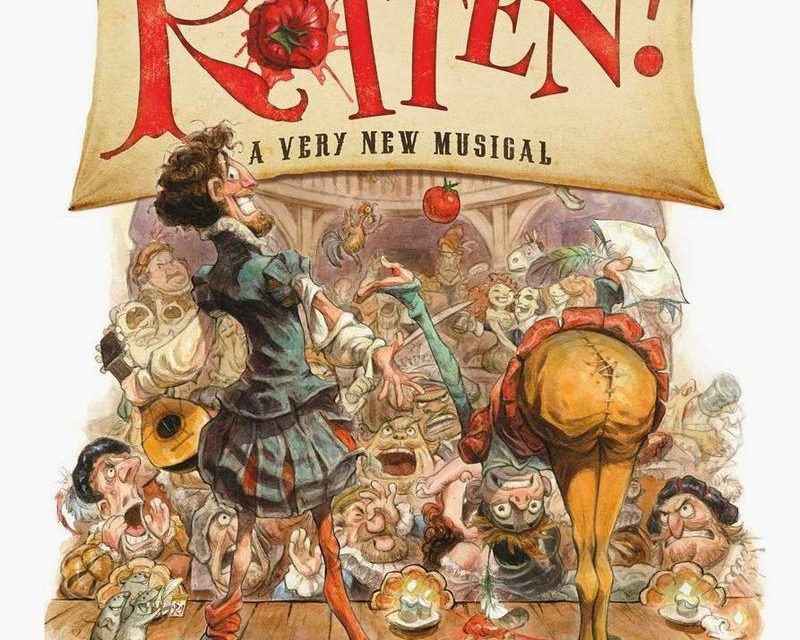The Kirkpatrick brothers’ uproarious, adrenaline-infused “Something Rotten!” follows in the footsteps of “South Park” collaborators Matt Stone and Trey Parker’s Broadway juggernaut, “The Book of Mormon” by employing the same critically acclaimed director and choreographer, Casey Nicholaw, to develop another madcap parody. Playing in Atlanta from April 17-22, the Tony-winning musical “Something Rotten!” which had a 22-month run on Broadway and was nominated for 10 Tony awards, mimics the same rambunctious antics of its predecessors, but never truly finds its stride.
Set in 1595, “Something Rotten!” follows the struggles of the Bottom brothers, Nick (Rob McClure) and Nigel (Josh Grisetti), as they try to find success in the theatrical world at the same time as William Shakespeare. Envious of Shakespeare’s wild success, Nick enlists the aid of a kooky fortune teller to foresee what Shakespeare’s next hit will be and steals it for himself. From there, the story unravels, filled with quarreling, love, deceit, thievery and phallic jokes, all reminiscent of a typical Shakespearean comedy.
The show’s humor is most successful — its witty one-liners and bathroom jokes consistently elicit huge laughs from the audience. Some jokes are high-brow, with references to Shakespeare’s works, while others are crass, such as an ongoing bit about the lack of proper plumbing during the Renaissance. Shakespeare (Adam Pascal) is hilariously reimagined as a plagiarizing, phony Mick Jagger-esque rock star addicted to fame and fortune. The play’s funniest musical numbers are its best, with “God, I Hate Shakespeare,” “The Black Death” and “Something Rotten!/Make An Omelette” garnering plenty of laughs from the audience.
The peak of the show (which doesn’t coincide with that of the plot) is its spectacular grand number in the first act, “A Musical,” an ode to the wonder and magic of the American musical. Steeped with countless musical theater references, the number is both a parody of and a love letter to the musical form. The song simultaneously celebrates its glory and grandeur while making fun of its odd traits, including its inclination towards jazz hands and dance breaks that don’t advance the plot. With its bright lights, dazzling set changes and huge dancing chorus, the number is goosebump-inducing and squeal-evoking for any musical theater lover, including myself. As the song acknowledges, “the crowd goes wild every time,” and that it did. By the end of the number, the crowd was hooting and whistling, begging for more.
It’s when the show attempts to go deeper and provide emotional complexity that it begins to deteriorate. The love story between Nigel and the daughter of a Puritan leader, who bond over their love of poetry, is shallow. Instead of deepening the plot, it harps on the overdone be-true-to-yourself cliche and disengages the audience. The show begins to make a feminist statement with Bea (Maggie Lakis), Nick’s wife, and her playful girl-power song “Right Hand Man,” but seems to forget about her character until the end when she suddenly reappears to save the day.
The end of the show is perhaps its biggest flaw. The show creates a great amount of problems for its characters but leaves no time to properly flesh them out or cleverly solve them. The characters go from rehearsing a musical number from their musical “Omelette: The Musical,” to Shakespeare suing them for stealing his ideas (by enlisting the aid of the psychic who wrongly predicted Shakespeare’s “Hamlet” as “Omelette”), to testifying in court, to (spoiler alert) escaping beheading to start a new life in America — all in just a matter of minutes. The potential consequences of the brothers’ actions are never established, so it is incredibly anticlimactic when they are suddenly threatened with death and escape only a few minutes later. The ending is confusing, unsatisfying and ultimately the show’s greatest weakness.
While “Something Rotten!” isn’t deep, it is a fun time and is at its best in its larger-than-life hilarity. It loses steam when it tries to be more than an extravagant, absurd satire, but its over-the-top dance numbers, genuinely funny jokes and charming characters make it worth your time. The play isn’t filled with thought-provoking dialogue or emotionally complex characters, but it is a good time.





